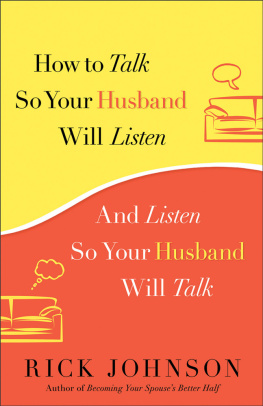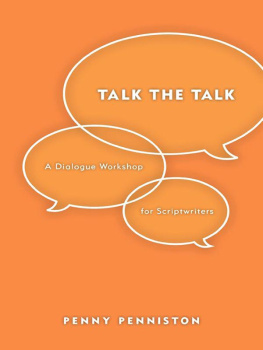Shad Helmstetter - What to Say When you Talk To Yourself
Here you can read online Shad Helmstetter - What to Say When you Talk To Yourself full text of the book (entire story) in english for free. Download pdf and epub, get meaning, cover and reviews about this ebook. year: 2011, publisher: Pocket Books, genre: Religion. Description of the work, (preface) as well as reviews are available. Best literature library LitArk.com created for fans of good reading and offers a wide selection of genres:
Romance novel
Science fiction
Adventure
Detective
Science
History
Home and family
Prose
Art
Politics
Computer
Non-fiction
Religion
Business
Children
Humor
Choose a favorite category and find really read worthwhile books. Enjoy immersion in the world of imagination, feel the emotions of the characters or learn something new for yourself, make an fascinating discovery.
- Book:What to Say When you Talk To Yourself
- Author:
- Publisher:Pocket Books
- Genre:
- Year:2011
- Rating:4 / 5
- Favourites:Add to favourites
- Your mark:
- 80
- 1
- 2
- 3
- 4
- 5
What to Say When you Talk To Yourself: summary, description and annotation
We offer to read an annotation, description, summary or preface (depends on what the author of the book "What to Say When you Talk To Yourself" wrote himself). If you haven't found the necessary information about the book — write in the comments, we will try to find it.
What to Say When you Talk To Yourself — read online for free the complete book (whole text) full work
Below is the text of the book, divided by pages. System saving the place of the last page read, allows you to conveniently read the book "What to Say When you Talk To Yourself" online for free, without having to search again every time where you left off. Put a bookmark, and you can go to the page where you finished reading at any time.
Font size:
Interval:
Bookmark:
WHAT TO SAY WHEN YOU
TALK TO YOUR SELF
Shad Helmstetter, Ph.D
Other books by Shad Helmstetter
Available now or coming soon in e-book format:
The Gift
Who Are You Really and What Do You Want?
The Self-Talk Solution
Self-Talk for Weight-Loss
Choices
What to Say When You Talk to Your Kids
You Can Excel in Times of Change
Receive Shad Helmstetters Todays Self-Talk
Daily Self-Talk and motivation sent to you via email:
www.shadhelmstetter.com/selftalk
Follow Shad Helmstetter on Facebook:
www.facebook.com/shadhelmstetter
Information on:
Life Coach Training and Certification
The Shad Helmstetter Life Coach Institute
www.lifecoachinstitute.com
Information on Self-Talk CDs:
www.selftalkstore.com
What To Say When You Talk To Your Self
Digital edition copyright 2011 by Shad Helmstetter.
All rights reserved. No part of this book may be used or reproduced in any manner whatsoever without written permission except in the case of brief quotations embodied in critical articles or reviews.
Published in e-book format by Park Avenue Press
362 Gulf Breeze Pkwy., 104, Gulf Breeze, FL 32561
ISBN-13 9780983631200 (EPUB)
ISBN-13 9780983631217 (KINDLE)
ISBN-13 9780983631224 (MOBIPOCKET)
ISBN-13 9780983631231 (SONY READER)
Published in mass market paperback edition by Pocket Books, a division of Simon & Schuster Inc.
ISBN: 0-671-70882-1

This book is dedicated, in loving memory, to my parents, Fred and Nora Helmstetterto my mother, who taught me persistence and perseverance, and to my father, who taught me that there is always a better way.
TABLE OF CONTENTS
INTRODUCTION
To The Digital Edition
Although this edition of What to Say When You Talk to Your Self has been updated to make it completely fresh and cogent for todays digital reader, from the first edition to now, it is remarkable how solidly the concept of Self-Talk has not only withstood the test of time, but has also proved how incredibly, vitally important Self-Talk is in each of our lives.
In fact, the discoveries in the field of mind/brain science that made the first edition of this book possible have expandedor rather explodedinto every area of our culture. In just twenty-five years, the concept of Self-Talk itself has grown from a relative breakthrough in the field of personal growth, to a broad and enlightening understanding of human behavior, and how it works in the lives of every one of us.
Today, most people in our computer world now understand that we get programmed from birth on, throughout life, and that we end up living out those programsfor better or for worse. But what hasnt changed is that many peoplewho want to do better in lifestill struggle to get rid of the old programs that are negative, or harmful, or are holding them back.
And in that quest, I can assure you that this updated edition will guide you well. The complete story of Self-Talk, how we get programmed and what to do about it, is all here, fully intact and ready to help.
Presenting this new edition also gives me the opportunity to recognize the many tens of thousands of readers, in many languages around the world, who have read this book in its printed format, and who have attested to the efficacy and the practical simplicity of making the new Self-Talk a part of their everyday lives.
If what is magic today becomes the science of tomorrow, then what was the magic of Self-Talk, just a few years ago, has now become the science of a whole new way of life.
Shad Helmstetter, Ph.D.
May, 2011
www.shadhelmstetter.com
You are everything that is, your thoughts, your life, your dreams come true.
You are everything you choose to be.
You are as unlimited as the endless universe.
Life, for most of us, should be pretty good.
We have all heard what life is supposed to offer: endless opportunities, the fulfillment of our dreams, and a chance to live each day in a way that brings happiness and success. Most of us want and need at least a successful job or career, a good family life, and reasonable financial security. We expect that from life. We know deep inside that we deserve our fair share and we have every right to attain it.
Why are some people, day to day, happier, more productive, and more fulfilled than others? What makes the difference? Is it Kismet, a kind of fate, which in some mysterious way charts our destiny and leaves little of the steering of our course through life up to us?
Is the control of our lives in our hands or isnt it? And if we can, or should , control our lives, what goes wrong? What holds us back? If we truly would like to do better, be the way we really would like to be, and be happier and more successful every day in every area of living, what is the wall that stands in our way?
AN UNLIMITED LIFE OF PRACTICAL POTENTIAL
Imagine living a life which did not give in to the barriers and the battlements, the hassles and the hurdles of everyday living. Imagine a life filled with the vitality of achievement and the enrichment of daily self-fulfillment. To me, for a long time that kind of life sounded like an impractical dream, a cardboard box filled up with daydreams and wishes. To live a life of hope, promise, expectation, and achievement was to live the life of someone who lived only in the pages of a book.
When I was quite young, I had a soaring imagination. Long before I learned what we could not do, I dreamed of doing what I knew we could . I remember, as a young boy, lying on my back in the cool, wet grass late at night, my mind sinking into the depths of the crystal-clear stars that blanketed the summer sky above me. I could reach out and touch those stars. I could imagine any dream and see it come true.
It was only later that my dreams gave way to more practical considerations. Star-filled heavens, dew-soaked grass, and princely dreams of imaginary kingdoms bowed to more rational requirements. As I began to pursue my education in earnest, I began to learn what we could not do. In time I became more intent on studying the laws and the limits of man, than on learning the far-reaching extremities of mankinds potential.
I learned all of the shoulds, musts, and can nots . I was told that it was bad to have your head in the clouds and it was good to have your feet on the ground. So I extracted my head from the magical excitement of the universe and got down to business learning about the more practical matters of survival and acceptance. From time to time I had the nagging suspicion that there was more to all of this than was meeting the eyeI just couldnt see it yet.
It was years before I decided it was time to stop and look at the stars again. But I did. The result of that one small decision changed my direction and my life.
By the time I stopped and sank once again, upwards, into the stars, I had completed a twenty-year odyssey which took me from the backroads of a farmland village to the towering offices of New Yorks Madison Avenue; from a quiet countryside of wheat fields to the negotiating tables of three-piece-suited attorneys and well-groomed marketers. My odyssey took me to snow-covered Midwestern college campuses, and to palm-lined streets of Western universities.
Somewhere, during that time, I began to wonder and dream again, as I had as a young boy years before. What if we could ? I wondered. What if we could find whats stopping us and turn it around? What if there is an answer and no one else has looked in the right place? What if any of us, at any time, could reach up and touch the stars ?
I began the first part of my search by studying human behavior. Thats something you can get a degree in without ever really figuring it out. It is also something that older people seem to know more about than younger people. No matter how many educational degrees my professors could profess, I suspected that some of the older, wiser people I knew had figured out what human behavior was all about long before we were taught courses in the subject.
Next pageFont size:
Interval:
Bookmark:
Similar books «What to Say When you Talk To Yourself»
Look at similar books to What to Say When you Talk To Yourself. We have selected literature similar in name and meaning in the hope of providing readers with more options to find new, interesting, not yet read works.
Discussion, reviews of the book What to Say When you Talk To Yourself and just readers' own opinions. Leave your comments, write what you think about the work, its meaning or the main characters. Specify what exactly you liked and what you didn't like, and why you think so.











